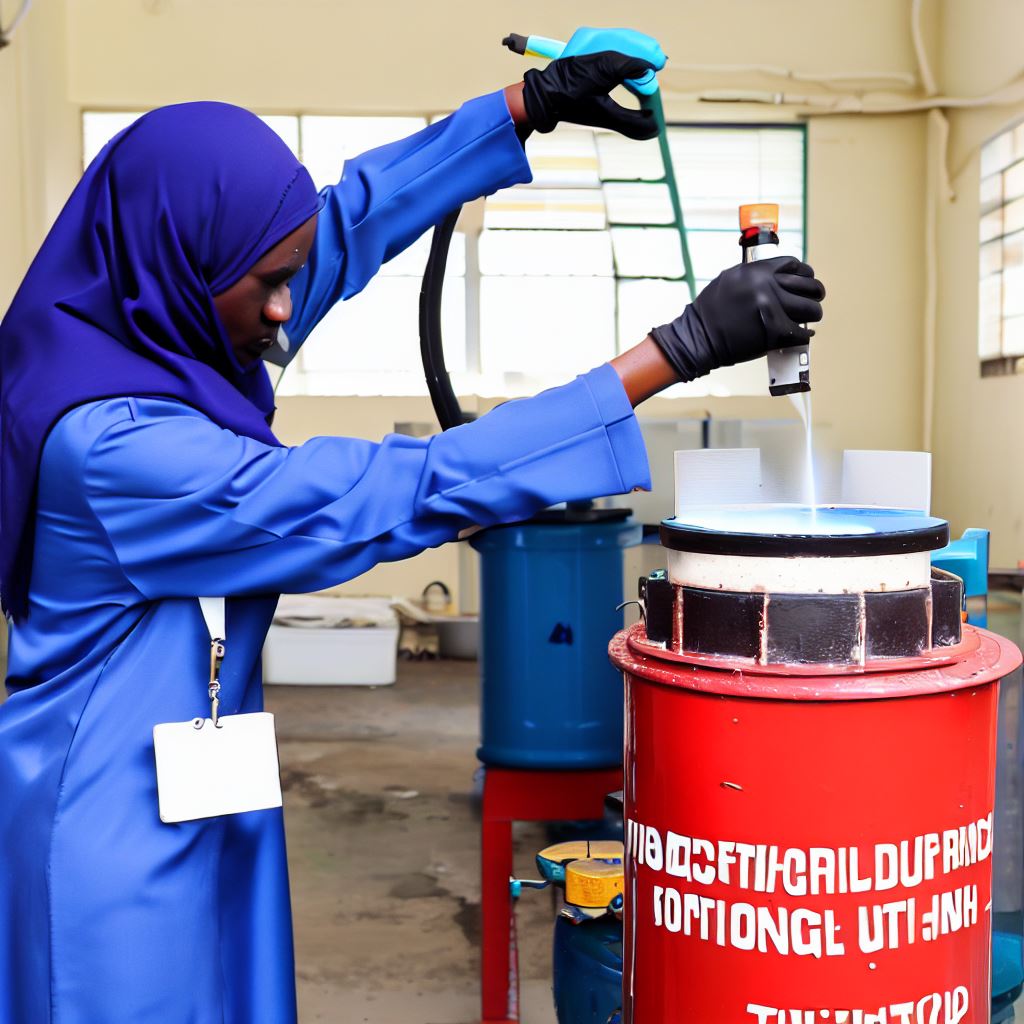Introduction
A coating technician plays a crucial role in applying protective coatings to various surfaces.
In Nigeria, there is a high demand for coating technicians due to the booming construction industry.
The purpose of this blog post is to provide individuals interested in becoming a coating technician in Nigeria with a comprehensive starter guide.
Briefly explain the role of a coating technician
- Coating technicians apply protective coatings.
- Prevent corrosion and damage.
- Work in diverse industries.
- Ensure product longevity.
- Skilled and vital role.
Highlight the demand and opportunities for coating technicians in Nigeria
- Growing industrial sectors.
- Oil and gas industry.
- Infrastructure development.
- Automotive and manufacturing.
- High demand for skilled technicians.
Introduce the purpose of the blog post: to provide a starter guide for individuals interested in becoming a coating technician in Nigeria
- Start a rewarding career.
- This guide offers insights.
- Training and certifications.
- Skills to develop.
- Job prospects.
- Path to success.
- Fuel your future in coating.
Understanding the Coating Technician Role
Responsibilities and Duties of a Coating Technician
- Prepare surfaces for coating application through cleaning, sanding, and repairing.
- Apply coatings using various techniques such as brushing, spraying, or dipping.
- Ensure coating thickness is appropriate and inspect for any defects or imperfections.
- Maintain and clean tools, equipment, and work area.
- Follow safety protocols and regulations to prevent accidents and injuries.
- Keep detailed records of coatings used, application processes, and outcomes.
- Collaborate with team members to ensure efficient workflow and achieve project goals.
- Provide technical support and guidance to colleagues and clients regarding coating application.
- Troubleshoot and resolve issues that may arise during coating application.
Importance of Coatings in Various Industries
- Coatings provide protection against corrosion, wear and tear, and environmental damage.
- They enhance the aesthetics of products, making them more visually appealing to customers.
- Coatings increase the longevity and durability of surfaces, saving costs on frequent replacements.
- They improve performance, reducing friction, and enhancing conductivity or insulation.
- Coatings play a vital role in sectors such as automotive, construction, manufacturing, and energy.
- They help maintain hygiene and cleanliness standards in food processing and healthcare industries.
- Coatings contribute to sustainability efforts by extending the lifespan of materials and reducing waste.
- Appropriate coatings can enhance safety by providing non-slip surfaces or fire-retardant properties.
- Innovative coatings can offer additional functionalities, such as self-cleaning or antimicrobial properties.
- Coatings support research and development, enabling advancements in various fields.
Skills and Qualifications for Succeeding as a Coating Technician
- Strong understanding of coating materials, techniques, and application processes.
- Knowledge of different types of coatings, their properties, and suitable applications.
- Ability to interpret technical specifications and follow instructions accurately.
- Good hand-eye coordination and manual dexterity for precise coating application.
- Attention to detail to identify defects, ensure proper coating thickness, and achieve quality standards.
- Problem-solving skills to troubleshoot issues and make necessary adjustments during application.
- Ability to work independently or as part of a team, depending on project requirements.
- Excellent organizational and time management skills to meet deadlines and handle multiple tasks.
- Strong communication skills to effectively collaborate with colleagues and provide customer support.
- Awareness of safe2ty protocols and the ability to maintain a safe working environment.
- A high school diploma or equivalent is typically required, while relevant certifications are beneficial.
- Prior experience in coating application or a related field is advantageous.
Education and Training
Relevant Educational Paths for Aspiring Coating Technicians in Nigeria
- Completion of secondary education with a focus on science subjects is a good starting point.
- Consider pursuing a diploma or degree in relevant fields such as Materials Science or Chemical Engineering.
- Apprenticeships and on-the-job training programs can also provide valuable hands-on experience.
- Continuous learning and staying updated with industry trends and technologies is crucial.
Technical Schools, Colleges, or Universities Offering Relevant Programs
- The Federal Polytechnic, Offa offers a National Diploma (ND) program in Industrial Chemistry.
- University of Lagos offers a Bachelor of Science (BSc) program in Materials Science and Engineering.
- Federal University of Technology, Owerri offers a Bachelor of Technology (BTech) program in Chemical Engineering.
- Yaba College of Technology offers a Higher National Diploma (HND) program in Science Laboratory Technology.
Importance of Obtaining Certifications and Licenses in the Field
- Acquiring certifications like the Coating Application Specialist (CAS) certification demonstrates expertise and professionalism.
- Obtaining licenses, such as the Nigerian Society of Coatings Technologists (NSCT) license, shows credibility and compliance with industry standards.
- Certifications and licenses increase employability, boost career prospects, and may lead to higher salaries.
- Maintaining certifications through continuing education ensures keeping up-to-date with advancements in the coating industry.
Read: Local vs. International Training in Sound Engineering

Gaining Practical Experience
Significance of Gaining Practical Experience as a Coating Technician
- Gaining practical experience is crucial for a coating technician to develop and enhance their skills.
- Practical experience allows technicians to apply theoretical knowledge in real-world scenarios.
- It helps technicians become familiar with the tools, materials, and processes used in the coating industry.
- Practical experience also exposes technicians to different challenges and problem-solving opportunities.
- Employers value practical experience as it demonstrates competence and the ability to handle job-related tasks.
Internship Opportunities and Apprenticeships Available in Nigeria
- Many coating companies in Nigeria offer internship programs for aspiring coating technicians.
- Internships provide hands-on training, exposure to different coating projects, and the opportunity to learn from professionals.
- Apprenticeships are also available, where aspiring technicians can work under experienced mentors to gain practical skills.
- Apprenticeships often span several years and provide comprehensive training in coating techniques.
- Both internships and apprenticeships are valuable for building a strong foundation in the coating industry.
Tips for Networking and Finding Mentors in the Coating Industry
- Attend industry events, conferences, and trade shows to meet professionals and expand your network.
- Join relevant professional organizations and associations to connect with experienced technicians.
- Utilize online platforms and forums dedicated to the coating industry to connect with industry experts.
- Reach out to coating companies and professionals directly to inquire about mentorship opportunities.
- Develop relationships with mentors by showing dedication, eagerness to learn, and a strong work ethic.
Networking and finding mentors is essential for career growth and gaining valuable insights in the coating industry.
In fact, gaining practical experience is highly significant for aspiring coating technicians in Nigeria.
It allows them to apply theoretical knowledge, familiarize themselves with industry tools and materials, and develop problem-solving skills.
Internship programs and apprenticeships provide hands-on training and exposure to different projects.
To increase networking opportunities and find mentors, attending industry events, joining professional organizations, and utilizing online platforms are recommended.
Building relationships with mentors can contribute to long-term career growth and success in the coating industry.
Read: A Guide to Sound Engineering Freelancing in Nigeria
Equipment and Tools
Essential equipment and tools used by coating technicians
- Spray gun: A device used to apply coatings onto surfaces efficiently and evenly.
- Compressor: Provides compressed air for the spray gun to atomize and propel the coating.
- Air supply system: Includes filters and regulators to ensure clean and consistent airflow.
- Abrasive blasting equipment: Used for surface preparation by removing dirt, rust, and old coatings.
- Sandblasting cabinet: A closed space where abrasive blasting takes place, protecting the environment.
- Protective gear: Safety glasses, goggles, gloves, respirators, and coveralls to shield against hazards.
- Coating thickness gauge: Measures the thickness of the coating layer to ensure proper application.
Cost of acquiring equipment and budget-friendly alternatives
- Spray gun: Prices range from ₦20,000 to ₦70,000. Consider purchasing a reputable budget-friendly brand.
- Compressor: Prices vary based on capacity, starting from ₦60,000 for a decent entry-level model.
- Air supply system: Filters and regulators can be purchased separately, starting from ₦5,000 each.
- Abrasive blasting equipment: Prices depend on size and features, ranging from ₦100,000 to ₦500,000.
Budget-friendly alternative: Opt for smaller handheld sandblasters, costing around ₦20,000 to ₦50,000.
Transform Your Career in Nigeria
Discover unmatched expertise with our personalized Career Consulting service. Navigate Nigeria’s job market with a strategy tailored just for you.
Get Started- Sandblasting cabinet: Prices range from ₦150,000 to ₦500,000, but DIY alternatives can be built at a lower cost.
- Protective gear: Basic sets can be bought for around ₦10,000, ensuring adequate safety during work.
- Coating thickness gauge: Prices start from ₦20,000, but consider renting if not frequently needed.
Reliable suppliers or stores in Nigeria
- Plasticote Industries Nigeria: Offers a wide range of coating equipment and tools, with branches in major cities.
- Vlisco Nigeria: Specializes in air compressors, spray guns, and related accessories.
- Coating Solutions Nigeria: Provides high-quality coating supplies and equipment nationwide.
- Local hardware stores: Check your local hardware stores for basic equipment, safety gear, and coatings.
- Online marketplaces: Platforms like Jumia and Konga offer a variety of coating equipment and tools.
Remember to compare prices, read customer reviews, and consider warranties and after-sales support when choosing suppliers and stores.
Seeking recommendations from experienced coating technicians can also help in finding reliable sources.
Read: Women Bus Drivers in Nigeria: Breaking Stereotypes
Safety Considerations
Emphasize the importance of safety precautions in the coating profession
- Safety should be the top priority for coating technicians to prevent accidents and injuries.
- Strict adherence to safety protocols ensures a secure working environment for both technicians and clients.
- Ignoring safety measures can lead to serious consequences, including health risks and legal liabilities.
Discuss the potential hazards and risks associated with coating applications
- Coating materials often contain hazardous chemicals that can be harmful if not handled properly.
- Exposure to toxic substances, such as volatile organic compounds (VOCs), can result in respiratory issues or skin irritation.
- Ignition hazards exist due to the presence of flammable materials during coating applications.
Provide tips on personal protective equipment (PPE) and safe handling of chemicals
- Coating technicians should always wear appropriate PPE, including gloves, safety goggles, and respirators.
- Coveralls or protective suits should be worn to prevent any skin contact with potentially harmful chemicals.
- Proper ventilation is crucial to minimize inhalation of hazardous fumes. Working in well-ventilated areas or using exhaust fans is recommended.
- Any spills or leaks should be immediately addressed and properly cleaned up to prevent accidents or contamination.
- Chemicals should be stored in designated areas, away from heat sources, and properly labeled for easy identification.
- Regular training and awareness programs should be conducted to educate coating technicians about safety practices and the handling of chemicals.
- Emergency procedures should be in place, including knowledge of first aid, fire extinguishers, and evacuation routes.
To have a successful career as a coating technician in Nigeria, prioritizing safety is of utmost importance.
By strictly adhering to safety precautions, technicians can create a secure working environment.
It is essential to understand the potential hazards and risks associated with coating applications, including exposure to harmful chemicals and ignition hazards.
Personal protective equipment (PPE) should be worn at all times, and safe handling of chemicals is crucial to prevent accidents or health issues.
Coating technicians should also be aware of emergency procedures and receive regular training to stay updated with safety practices.
By following these guidelines, coating technicians can ensure their own well-being and maintain a high standard of professionalism in the industry.
Read: Sound Engineers: Impacting Nigeria’s Live Events
Job Prospects and Opportunities
Industries that Hire Coating Technicians in Nigeria
- Oil and gas: Coating technicians are in high demand in this industry due to the need for corrosion protection of pipelines and equipment.
- Marine: Shipbuilding companies require coating technicians for the surface treatment and protection of vessels.
- Aerospace: Coating technicians are essential for maintaining and repairing the protective coatings on aircraft.
- Automotive: Car manufacturing and refinishing industries hire coating technicians for painting and corrosion prevention.
- Construction: Coating technicians work in construction companies to apply protective coatings on buildings and infrastructure.
Career Growth and Advancement Opportunities:
- Promotions: Coating technicians can move up the ladder to become coating supervisors or managers.
- Specialization: With experience, technicians can specialize in specific coating techniques or materials.
- Consultancy: Some coating technicians venture into consultancy, providing expert advice and solutions.
- Entrepreneurship: Skilled technicians can start their own coating businesses and offer services to various industries.
Average Salaries and Benefits in the Field
If you’re considering a career in Nigeria as a Coating Technician, you’re in for a promising journey.
This field offers a wide spectrum of opportunities influenced by factors like experience, location, and industry. The average annual salary typically ranges from ₦500,000 to ₦2,000,000.
Apart from competitive salaries, Coating Technicians often enjoy comprehensive benefits, including medical insurance, retirement plans, paid leave, and performance-based bonuses.
These perks form a significant part of the employment package, making this career path financially rewarding.
The realm of coating technology caters to various industries, including oil and gas, marine, aerospace, automotive, and construction.
The demand for skilled Coating Technicians is constant, making job prospects highly promising.
One of the remarkable aspects of this field is the potential for career growth. With experience and additional training, you can advance to supervisory or management positions within your industry.
Moreover, you can choose to specialize in specific coating techniques or materials, opening doors to consultancy opportunities.
Entrepreneurial spirits can establish their own coating service businesses, offering expertise to a range of industries. This not only generates income but also provides autonomy and control over your client base.
In short, pursuing a career as a Coating Technician in Nigeria promises exciting opportunities, financial rewards, and avenues for advancement.
It’s a fulfilling path for those passionate about enhancing and protecting surfaces through coatings.
Resources and Additional Support
Recommend books, online resources, and industry publications for further learning and knowledge enhancement
- “Introduction to Coating Technology” by John K. Vij
- “Principles of Coatings Chemistry” by Pedro J. J. Alvarez
- “Coating Technology Handbook” by Arthur A. Tracton
- “Handbook of Surface and Nanometrology” by David J. Whitehouse
- “Paint and Coatings: Applications and Corrosion Resistance” by Philip Vyas
Mention professional associations or organizations related to coating technology in Nigeria
- Nigerian Association of Coating Engineers (NACE)
- Coating Technologists Association of Nigeria (CTAN)
- Nigerian Institute of Painting (NIP)
- Nigerian Corrosion Society (NCS)
Encourage readers to join relevant forums or online communities for networking and support
- Coating Technology Forum: A platform for professionals in the coating industry to share knowledge and seek advice.
- Nigerian Engineering Network: An online community that provides networking opportunities for engineers, including coating technicians.
- LinkedIn Coating Technology Group: Join this group to connect with industry professionals and participate in discussions and knowledge sharing.
By utilizing these resources and seeking out additional support from professional associations and online communities, aspiring coating technicians in Nigeria can enhance their knowledge, network with industry experts, and stay updated with the latest developments in the field.
Continuous learning and engagement with the industry are crucial for career growth and success in the coating technology sector.
Conclusion
This blog post highlighted the key points to consider when becoming a coating technician in Nigeria.
Publish Your Professional Profile, Business or Brand
Showcase your expertise, gain trust, and boost visibility instantly on Professions.ng.
Publish NowIt emphasized the importance and potential of pursuing a career in this field, showcasing the numerous opportunities available.
We encourage readers who are interested in this profession to take the next steps towards becoming a coating technician.
If you need any support or guidance along the way, feel free to reach out to us. Good luck!




